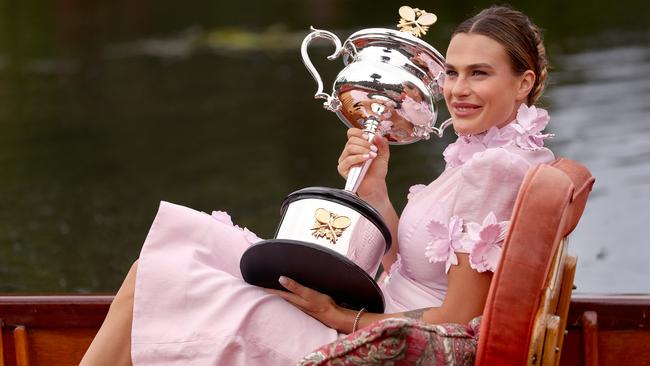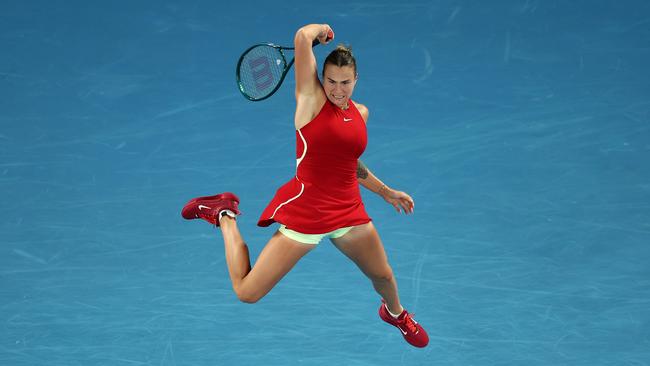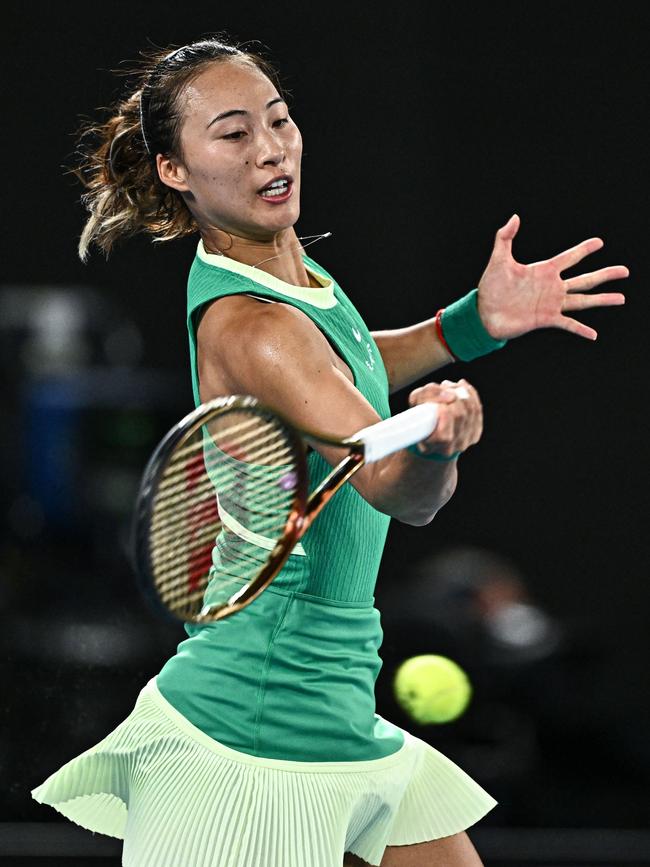Australian Open final: Aryna Sabalenka goes from hated and hopeless to holding court
The Belarusian’s recovery from tear-filled depths of despair to winning last year’s Australian Open and briefly holding the World No. 1 ranking – she’s No. 2 now – is one of the great comeback stories in sport.

In the corridor at Rod Laver Arena is a clock. Next to the clock is a sign. The sign is a quote from Rod Laver. The quote says, “The place to concentrate is on the court. There the rest of the world doesn’t exist.”
Less than two years ago, Aryna Sabalenka played as if the world was caving in around her. She had the horror-show serving yips. She was grieving after the sudden passing of her father. They were meant to be doing this together. She was having complete emotional breakdowns in every match. Screaming. Bawling. It was uncomfortable. Unwatchable. Ukr-ainian players treated her like she was the one bombing Kyiv.
She was banned from Wimbledon because of Belarus’s complicity in Russia’s invasion and when she lost in the third round at the French Open, Parisians took their slim cigarettes from their mouths just long enough to boo her out the door.
She felt hated. Hopeless. The place she couldn’t concentrate was on the court. She sat on the locker room floor at Roland Garros and cried. Again. All she ever seemed to be doing was crying. “I felt like everyone hate me because of my country,” she told her entourage. The Netflix cameras were on her. “Now everyone is watching me f…..g lose it. I don’t even want to play tennis anymore.”
I didn’t even want to watch her any more. It was desperately sad. She was likeable and big-hearted but her career was riddled with anxiety, failures and disappointment.
You wouldn’t have blamed Sabalenka for throwing her racquets, red dresses, red shoes, red sweatbands, coach, physio and agent into the River Seine and never playing again. When she served 21 doubles faults in a first-round loss at the Adelaide International, she cried hysterically on the court, cried off the court, always crying.
Her yips were so god-awfully bad some serves bounced before the net. She tried underarm and even that didn’t work. Concentrate on the court? Easy for Laver to say.
Sabalenka served 428 double faults in 2022. It was embarrassing. Excruciating. It was 151 more doubles than anyone else. Her father, Sergey, had suddenly died aged 43, and their plan had always been to win majors by the age of 25. She was turning 24, and she had zero majors, and zero prospects any time soon, because you can’t win majors if you can’t bloody serve, and she felt like she was letting him down, and she was trying too hard, and she was putting too much pressure on herself, and the war was stressing her out, and the idea of the outside world not existing on a tennis court was laughable.
“Something changed. I just changed,” she says. “Before, I would go crazy on myself. I’ve been through a lot of tough moments. They always say everything happens for a reason but I couldn’t understand. What’s the reason? What did I do wrong? Did I do something wrong to deserve it?
“I think I wouldn’t have won a grand slam without those situations. I would still be emotional every time, I would be screaming and crying on the court instead of playing tennis. Because of those times I have become a different player. I have become a little bit calmer on the court. I have started to respect myself a little bit more. I have more belief in myself because I came through that year.”

Sabalenka’s recovery from her career-threatening depths of despair to winning last year’s Australian Open and briefly holding the World No. 1 ranking – she’s No. 2 now – is one of the great comeback stories in sport. She defends “Daph” – the Daphne Ackhurst Memorial Cup – against China’s Qinwen Zheng at Melbourne Park on Saturday night.
“I’m just thinking about what I have to do,” she says on the WTA Insider podcast. There are no other thoughts in my mind, like getting crazy, like getting upset. I’m super-focused. I’m super happy with that. I’ve tried to work on my behaviour. It’s good for me. This is what I feel, this is what I have to do. I have to become a little bit boring on the court to reach my goals.”
She ain’t boring. Still treats every point as if the match and her very sanity depends on it. Still slumps her shoulders after double faults – eek! – like someone has shot her dog. I’m not sure what tension her racquet strings are, but they’re not as highly strung as her. To her credit, she’s worked herself out. She still has the brooding air of a volcano that could erupt at any second but she’s learned the art of fighting. You’re meant to beat the foe, not yourself.
“I kind of understand a little bit better now what fighting really is,” she says. “It’s about working through a tough moment and not getting too emotional. Control yourself and think about what you have to do.
“Before I thought if I was screaming ‘C’mon’ and hitting the ball hard that this is fighting. Now I have to understand the fight is being able in a tough moment to keep working, keep thinking about what you have to do instead of having all these emotions. No matter what the score is now, I just keep fighting.”
The place to concentrate is on the court. Sabalenka will be dressed in red from head to toe. She could go straight from Rod Laver Arena to a cocktail lounge without really needing a change of clothes. It’s a throwback to the days of Tiger Woods’s red shirts on the final day of golf majors. He thought red exuded an air of dominance and confidence – a couple of traits Sabalenka is banking on against a 21-year-old contesting her first decider at a major.
“The feeling is incredible to arrive at my real first grand slam final,” Zheng says. “That’s my dream since I was a kid. So right now I’m really happy but I know there’s still another fight to go. I’m trying to control my emotions right now. Sabalenka’s the big hitter right now on the tour. She’s got the most big serve, the most big forehand, the most big backhand. She’s really a complete player. But you know, it’s a match. Let’s see what’s gonna happen in the final there. My dream is not just to be in the final. There is still something needs to go on.”

Zheng is the second Chinese player to reach a major final. Li Na is at Melbourne Park on the 10-year anniversary of her Open victory. Asked if she thinks it’s destiny to win with Na in the crowd, Zheng grins: “You know, when everything is working well, I believe on the destiny. But if the destiny doesn’t go on my side, I don’t believe that at all. Only depends where destiny goes.
“She’s given me advice. She tells me, ‘Don’t think too much. Just go for it.’ That’s enough. She means a lot for all Chinese kids. She’s the first one who won the slams. That’s unbelievable for an Asian woman. She gives a lot of hope in that moment to kids of my age. She means a lot to everyone.”
Zheng will need to forget the world exists outside of RLA. Forget that hundreds of millions of Chinese will be watching the TV broadcast. Forget the enormity of the opportunity. Regardless of the cute quote on the wall, the stakes can make concentration impossible for a first-time finalist. She may have the masses on her side, though. Sabalenka doesn’t always get the majority of support. Folks admire the heart-on-sleeve effort and thunderous stroke play but the deafening grunting can be grating. Occasionally it extends so long you suspect her opponent is distracted. Na was a crowd favourite. Zheng may be the same.
“We have lot of Chinese supporting me in the stadium,” she says. “Feels like I play in China. There will be challenges everywhere. To arrive in the final, everybody needs to face pressure. Who can deal better? It’s my first final and it’s special and I need to deal with it. I have specific routines. It’s just you guys never see them. Our team is actually a little bit obsessed with the routines but I don’t want to tell you more about the details because it sounds too crazy. I will just say, ‘Enjoy the final and let’s fight’.”


To join the conversation, please log in. Don't have an account? Register
Join the conversation, you are commenting as Logout